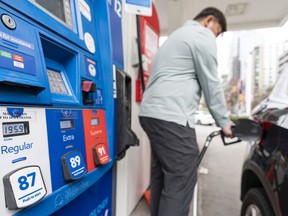B.C.'s premier says the ICBC rebate is meant to ease the financial burden of increased gas prices caused by the invasion of Ukraine by Russian forces.

Article content
Premier John Horgan’s offer of $110 rebates to ICBC policy holders as a “one-time relief payment” to help consumers with high gasoline prices isn’t going to go very far, according to drivers who were filling up in Vancouver on Friday.
Advertisement 2
Article content
“It’s a stop-gap. It doesn’t address (high gas prices) long-term,” said Michael Santos, a Vancouver sales and business-development representative who was at an Esso station at Burrard and Davie where regular gas was 195.9 cents per litre.
With Vancouver gas prices hovering around $2 per litre, the $110 rebate will pay for about three weeks worth of driving for Santos, who now thinks twice about making sales visits.
“If it’s expensive to go there, it doesn’t make prospecting very lucrative,” Santos said.
The $110 represents about one tank of gas for Langley teacher Tracy Croutch.
“I know it’s a gesture, but it doesn’t really help,” said Croutch, who would simply prefer lower prices.
Horgan, however, said the one-time payment is “a significant contribution at a very difficult time for drivers as they look at the price at the pump and know that there’s relief on the way,” in announcing the payment along with Public Safety Minister Mike Farnworth.
Advertisement 3
Article content
Soaring gas prices are in part the result of Vladimir Putin’s invasion of Ukraine, Horgan said, and the volatility is hurting consumers worldwide, not just in B.C. ICBC’s robust financial results allow the corporation to offer this measure of relief.
Government critics, however, called the rebate a political move that doesn’t deliver the relief consumers need or get at the root problem of unaffordability.
“This is simply them trying to get out of what they’re obviously getting bad polling numbers on, and trying to figure out a way to change the dial,” said Kamloops-North Thompson MLA Peter Milobar during an appearance on pundit Mike Smyth’s show on CKNW.
The rebate will cost ICBC $395 million and will be paid out as $110 rebates to individual policy holders and $165 for commercial-vehicle policy holders. It will go to customers who held basic insurance policies with the Crown corporation in the month of February.
Advertisement 4
Article content
A rebate, however, is something ICBC could have offered regardless of the crisis and could have been more generous, said policy analyst and retired civil servant Rick McCandless.
“They’re linking it to trying to help out at the gas pump, and that’s fine, but the main purpose is to give back excess money (to ICBC policy holders),” McCandless said.
McCandless estimated ICBC has as much as $450 million in capital that is excess to its legislated need for reserve funds, which could have been paid out in rebates of $125 to $150.
That is based on an analysis of the corporation’s publicly available financial information McCandless published after the province released its latest budget.
McCandless said gas prices are being driven up by more factors than just the invasion of Ukraine, but a resolution to the war would start to ease prices and “take the pressure off governments to do something right by the taxpayer.”
Advertisement 5
Article content
“In the meantime, because of the risks (of) a potential recession, the government has to take some measure to provide relief,” he said.
Milobar, however, who is also the B.C. Liberal finance critic, said rebates don’t target the people who need the help most and gives it to those who need it the least.
“The fact that a single parent working two jobs and driving a Honda Civic is getting the same one-time rebate as a Tesla owner is ridiculous,” Milobar said in a statement.
B.C. Green party leader Sonia Furstenau said it was shortsighted to target rebates only for drivers when “the affordability crisis, made worse by rising gas prices, affects all British Columbians.”
“Whenever there is an opportunity for transformative change, the B.C. NDP doubles down on the status quo,” she said in a series of Tweets published Friday.
Furstenau said the government would be better off if it took the $395 million and “leaned into permanent solutions to transportation problems in this province.”
She added that a better way to deal with the crisis would be to look at using the $2 billion generated by the carbon-tax to provide more generous and consistent rebates to “encourage a shift away from oil and gas.”
— with file from Canadian Press
https://news.google.com/__i/rss/rd/articles/CBMia2h0dHBzOi8vdmFuY291dmVyc3VuLmNvbS9uZXdzL2ItYy1nb3Zlcm5tZW50LWFubm91bmNlcy1vbmUtdGltZS0xMTAtcGF5bWVudC10by1kcml2ZXJzLWZvci1nYXMtcHJpY2UtcmVsaWVm0gGZAWh0dHBzOi8vdmFuY291dmVyc3VuLmNvbS9uZXdzL2ItYy1nb3Zlcm5tZW50LWFubm91bmNlcy1vbmUtdGltZS0xMTAtcGF5bWVudC10by1kcml2ZXJzLWZvci1nYXMtcHJpY2UtcmVsaWVmL3djbS9hY2E3YWEwYi1kNDAzLTRlMWQtYTk5OS0wY2M2MWU5NmI1NTcvYW1wLw?oc=5
2022-03-26 00:33:45Z
1355123312
Tidak ada komentar:
Posting Komentar